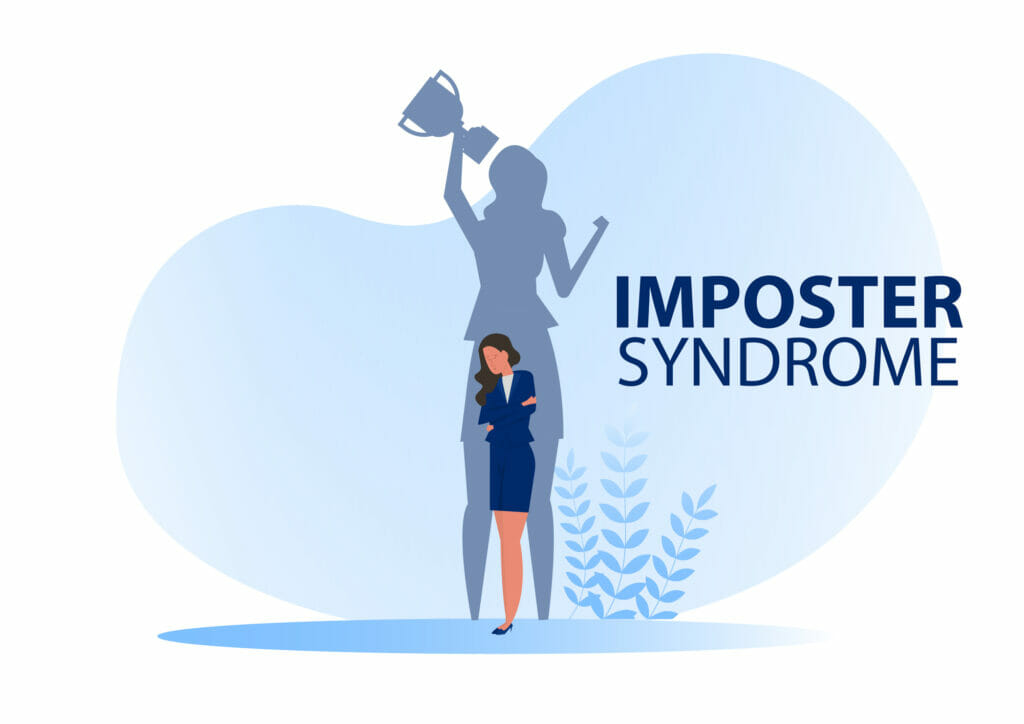You have a good education, a job people look up to, and everyone praises you. However, is there this voice in the back of your mind saying, “What if they find out I cannot do it,” making you feel like a fraud? Is it often difficult for you to be proud of yourself? Do you find everything you do just normal? Do you doubt or second-guess yourself? Or do you turn to perfectionism and work harder to perform better? If you recognize yourself in any of these statements, you may be dealing with insecurity, better known as impostorism, impostor phenomenon or impostor syndrome. Fortunately, you can influence it.

What is Impostor Syndrome, Impostorism or Impostor Phenomenon?
Impostor Syndrome is not an official mental health diagnosis. Rather, it is a response to society’s pressure to achieve, combined with a collection of life experiences and personality traits. In short, it is a thinking pattern that can lead to negative self-talk and self-doubt. Using the term “syndrome” is therefore deceptive because it is not a diagnosis; it is a normal human response that many people experience in their lives.
People who suffer from imposter phenomenon set the bar incredibly high for themselves and underestimate their achievements. As a result, no matter how well they do their job or how many degrees or compliments they amass, they are constantly afraid of being exposed because they doubt their qualities. In addition, impostor feelings are often accompanied by anxiety and depression and are associated with impaired job performance, job satisfaction and burnout among various employee populations.
Recognize the Signs
Research shows that the phenomenon occurs equally among men and women, and the higher educated, the stronger the feelings of impostorism. In addition, intelligent people who have low self-esteem, often self-doubt, and have traits of perfectionism are at a higher risk. Additional triggers for impostorism are having been raised in an overprotective family or within a family focused on achievement.
Career milestones can also trigger impostorism. Every new step makes you doubt whether you can perform. Negative stereotypes can also lead to impostor feelings, especially among minorities and women. If others decide, based on prejudice, that you cannot be successful or intelligent, being successful or intelligent can feel like betrayal.
Validation?
Promotions and other (external) validations often do not help people who feel like a phony; they might feel temporarily relieved when something has gone well. However, every new success in their eyes confirms that they are an impostor. People dealing with impostor feelings, more often than not, do not acknowledge their achievements as their own. According to their mindset, success has little to do with their abilities but is mainly a matter of chance, luck, and external circumstances. In addition, they do not value their performance; they assume that anyone can do what they do.
Risks of Burnout
Risk 1: Overachieving
The risk of burnout as a consequence of impostor phenomenon is real. Many fight against their insecurity by working excessively hard. The first scenario is that you start working harder and become a perfectionist. You do not want to make mistakes because that is proof that you really ‘are not able to do it.’ The hard work leads to the desired result. Unfortunately, you do not attribute this success to your competencies, but to luck or the support of others. You feel that the subsequent success depends on external factors, so you do not rely on your competencies for the next challenge. As a result, you continue to feel insecure and are afraid that you will not succeed. This makes you work even harder, becoming even more of a perfectionist, leading to stress-related complaints that eventually can contribute to burnout.
Risk 2: Avoidance
There is a different approach to deal with self-doubt – fleeing. You do not set the bar unrealistically high but too low for yourself. In order not to be exposed, you avoid challenges. This feels safe wherein you will not fall too hard if you do not reach high. However, if you avoid challenges, you will not experience success either. That means that you cannot experience your strengths. In addition, this protective mechanism ensures that the impostor feelings become strong. Consequently, long-term ambitions might decrease or disappear, deteriorating your overall sense of happiness with burnout waiting to happen.
Overcoming Impostorism
1. Understanding the fears
First, it is helpful to understand exactly what you are afraid of. For example, you fear ending up rejected by everyone or even that you will never reach your goals. Reflecting on those internal fears helps you realize that it is not justified. In addition, practicing reflecting on these fears helps it become easier to recognize impostor thoughts and not act on them anymore.
2. Reflect on the origin
Reflect and ask yourself critical questions. Often the most dysfunctional behaviors have been helpful at some point. How has impostorism ever been functional or helpful in your life? Could it be that this pattern came into your life for a reason? When was it necessary to take the blame when something went wrong? How was it helpful or necessary not to take the for yourself when you did something successful? Who or what could you be loyal to by believing that you are not able to do something? How did not having to succeed provide a feeling of safety?
3. Second opinion
Another helpful tool is to turn to someone more removed from the situation that triggers the impostor feelings. Research shows that people who seek support from a direct colleague or peer will only feel worse because they will often compare themselves to them. However, a family member, a sibling or a friend can help you zoom out and shift the focus from your insecurities to your qualities.
8 Steps to Reduce Impostorism
- Share your feelings with others. Knowing that you are not alone helps a lot.
- Separate feelings from facts. Just because you feel like a fraud does not mean you are one.
- Emphasize the benefits of your personality. Perfectionism can indicate a healthy ambition to excel. You just do not want to excel in everything. Put your best foot forward when it matters but allow yourself to do routine tasks on autopilot. Forgive yourself if the inevitable mistake occurs.
- Develop a new way of dealing with and thinking about mistakes and failures. Focus on being YOUR best, rather than being THE best. Read more about dealing with failure here. June 2022.
- Understand and adjust your own rules. If you abide by strict rules such as “you can never be wrong” or “you should not ask for help,” realize that you have just as much right as anyone else to be wrong, not to be informed, to have a bad day, or to ask for help.
- Adopt new thinking patterns. When starting a new job, instead of thinking, “Wait until they find out I have no idea what I am doing,” make an active effort to think differently. For example, everyone who starts somewhere new feels insecure initially. Think, “I may not know everything, but I am smart enough to find out.”
- Visualize your success instead of thinking about disasters. Just as successful athletes do, envision what it looks like for you to reach your goals.
- Do not wait until you can before you do and take (appropriate) risks. Your confidence will grow with you.
Final note
Feeling insecure does not make you an impostor. Most people with impostor feelings suffer in silence and do not talk about it. This is a consequence of the experience that they fear they are “going to be found out.” However, this experience is not at all uncommon. With practice and talking about it, it is possible to stop feeling like a fraud and learn to celebrate your accomplishments.
Finally, some reassurance: People who suffer from impostor phenomenon most probably do not have to worry that they are not capable enough. The opposite occurs with the Dunning-Kruger effect – a cognitive bias wherein less knowledgeable or competent people strongly overestimate their knowledge or competencies. This prevents them from recognizing that their choices and conclusions can be wrong.
Emerald Mental Health specializes in helping pilots and flight attendants via counseling and mental health coaching. Reach out if you need help with this or any other issue.
Sources
Bravata, D. M., Watts, S. A., Keefer, A. L., Madhusudhan, D. K., Taylor, K. T., Clark, D. M., Nelson, R. S., Cokley, K. O., & Hagg, H. K. (2020, April). Prevalence, predictors, and treatment of Impostor Syndrome: A systematic review. Journal of general internal medicine. https://www.ncbi.nlm.nih.gov/pmc/articles/PMC7174434/
Young, V. (2020 – 10 Steps You Can Use to Overcome Impostor Syndrome
https://impostorsyndrome.com/articles/10-steps-overcome-impostor/




















































